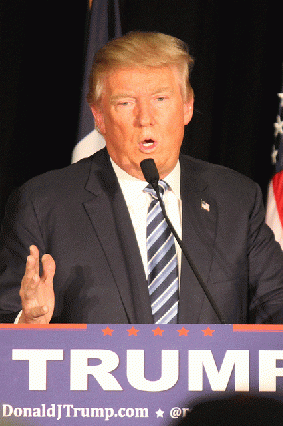With TJ Cox's victory in California, Democrats' gains in the House total 40 seats. But that won't stop Donald Trump and his obedient Senate from consolidating power in his presidency. Trump has neutered the Senate and stacked the Supreme Court with justices he believes will accommodate him. In effect, he's stealing their power. As a result, we no longer have three co-equal, independent branches of government.
Trump's tweets attacking Mueller and the Russia investigation are part of that pattern. There's a method to his outbursts; he demeans Mueller, Comey and our intelligence agencies to erode their credibility and get more power for himself. He has long defamed the investigation as "fraudulent" and "a cancer," and accused Mueller of partisanship for appointing Democrats as investigators (Mueller's a Republican). He casts Mueller as "totally conflicted" due to a "nasty business transaction" with Trump (Trump's attorney dismissed that as "nonsense"). He portrays the intelligence agencies as part of a "criminal deep state."
These ploys have succeeded. Before 2016, 70% of Republicans and Democrats supported the FBI. After Trump they berated it for not recommending indicting Hillary Clinton, and support plummeted. Now 44% of Republicans and Republican-leaning independents view the agency favorably.
To counter such tactics, Democrats need a spokesperson forceful enough to alarm Americans about the damage they're doing to our democracy. Io wa Democrats have the right idea-- they want someone with "energizing charisma " to counter Trump's rowdy base." But until such a leader emerges, the Senate will continue to do Trump's bidding.
Republicans depend on Trump's base to win elections, so they won't cross him. His base hovers around just 24% of the electorate, yet its impact on the midterms was often decisive. Republicans did well in states where Trump's 2016 margin of victory was wide. His frenetic campaigning turned out conservatives in deep red states, including Mississippi, where Trump's credited with Cindy Hyde-Smith's victory.
The absence of Republican opposition to Matthew Whitaker's appointment as acting Attorney General exemplifies the Senate's subservience. It confirmed Whitaker even though he called the Mueller investigation a "witch hunt," said federal and Supreme Court judges should have "a Biblical view of justice," and was implicated in a scam that bilked consumers out of millions.
There's more evidence of Senate fealty in Mitchell McConnell blocking legislation to protect Mueller's investigation and the Brett Kavanaugh's confirmation to the Supreme Court. 71% of Americans oppose overturning Roe v. Wade and 61% favor stricter gun control . Kavanaugh's sentiments clash with theirs but resonate with white evangelicals, a stronghold within Trump's base . Republicans confirmed him despite his unpopular views, sexual misconduct accusations and his injudicious "what goes around comes around" threat. Now, with a 53-seat Republican majority, the Senate will continue to install Trump nominees opposed by most Americans.
Trump steals additional power from the judiciary by attacking its legitimacy. He described the Keystone pipeline decision as politically motivated and a "disgrace." When the Ninth Circuit ruled Trump couldn't terminate DACA, he falsely said the Court's decisions had been reversed more than any other, calling it "a total disaster and out of control -- He tweeted that the decision blocking his initial Muslim travel ban was "ridiculous -- and attributed a restraining order against denying asylum applications to an "Obama judge."
Trump and Nixon are the only presidents who tried to strong-arm the Federal Reserve. But Trump takes Fed-bashing to a new level, calling the Fed"crazy" and Chairman Jerome Powell "the biggest risk" to our economy. The Fed's independence prevents politicians from influencing monetary policy to boost their reelection chances at the expense of economic stability -- just what Trump wants. Defying that boundary, Trump pointedly let Powell know he wants lower interest rates.
Trump also damaged the credibility of media that are critical of him. He adopted Lugenpresse, or "lying press," tactics from 1930s Germany, attacking journalists as the "Enemy of the People," dishonest and hateful. 85% of Trump's strongest supporters and 46% of Americans now believe the press fabricates stories about Trump; only 11% think it's honest about him.
In The Suffocation of Democracy, Christopher Browning traces similarities between Trump and totalitarian Germany. The Third Reich replaced parliamentary government with authoritarian rule, emasculated the press and established special courts to increase political reliability of decisions. Trump condemns the media, leverages his base to constrain Congress and stacks courts with judges who accommodate his politics.
Many hope a divided Congress will limit this runaway president. But it's in Trump's DNA to berate and divide rather than compromise and risk the appearance of weakness. No meaningful conscience among Republican lawmakers has emerged to reign him in. As Browning writes, outlandish behavior has "... often escaped the control of leaders far more talented than Trump." Absent a leader who can stoke some outrage, we could be farther along the unthinkable path to pulling down the pillars of democracy.





